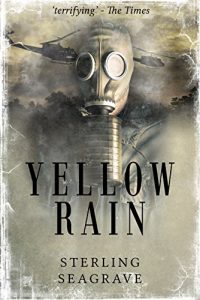The use of poison gas — chlorine, phosgene, mustard — during World War I forever changed the face of modern warfare.
Yet poison gas, and its far deadlier successors, nerve agents like sarin and soman, remained oddly absent from the world stage during World War II.
The possibility that poison or nerve gas could be used spurred the development of more and deadlier toxins as insurance against other countries taking the same action — the production of which poisons continued unabated even after the war ended, providing the threat beneath the uneasy stalemate of the Cold War.
The United States was left with stockpiles of earlier iterations of gases held in arsenals around the world and nothing to use them for, especially with such weapons banned by international law.
But while the world on the surface seemed content to keep their deadly super-poisons locked away, whispers from around the globe in the latter half of the twentieth century suggested that this was not the case at all.
Since 1979, rumours of a poison hundreds of times deadlier than nerve gas leaked out of the war-zones of Laos, Cambodia, and Afghanistan, born on the lips and bodies of survivors who watched their friends and families die in excruciating pain.
The gas was known as ‘yellow rain’ and, like all chemical weapons, it is banned by every international and moral law.
For years the connections between the sites of distribution were not made — too far apart geographically and in time, with no single known chemical capable of causing the symptoms, each instance was written off as a tragedy without any real answers.
Sterling Seagrave’s investigation into yellow rain takes him across the world as, over the course of several years, he pieces together fragments of information to finally reveal the origin of the super-toxin for the first time.
Seagrave expands his analysis of T2, one of the most lethal poisons ever invented, and created from a virulent spore found on grain, into a terrifyingly readable survey of the silent but steady growth of chemical arsenals worldwide.
‘His story is a terrifying one…he does not confine his investigation to the Russians alone. He is equally critical of American deceits over chemical and biological weapons.’ - The Times
'compulsively readable' - International Herald Tribune
'Fast-paced and jammed with racy details' - New York Times Book Review
Sterling Seagrave is an American historian and investigative journalist whose work has appeared in many major newspapers and magazines, including The Washington Post, Time, and Smithsonian. He grew up in Asia and the United States. He is also the author of The Soong Dynasty, The Marcos Dynasty, and Gold Warriors.
Yet poison gas, and its far deadlier successors, nerve agents like sarin and soman, remained oddly absent from the world stage during World War II.
The possibility that poison or nerve gas could be used spurred the development of more and deadlier toxins as insurance against other countries taking the same action — the production of which poisons continued unabated even after the war ended, providing the threat beneath the uneasy stalemate of the Cold War.
The United States was left with stockpiles of earlier iterations of gases held in arsenals around the world and nothing to use them for, especially with such weapons banned by international law.
But while the world on the surface seemed content to keep their deadly super-poisons locked away, whispers from around the globe in the latter half of the twentieth century suggested that this was not the case at all.
Since 1979, rumours of a poison hundreds of times deadlier than nerve gas leaked out of the war-zones of Laos, Cambodia, and Afghanistan, born on the lips and bodies of survivors who watched their friends and families die in excruciating pain.
The gas was known as ‘yellow rain’ and, like all chemical weapons, it is banned by every international and moral law.
For years the connections between the sites of distribution were not made — too far apart geographically and in time, with no single known chemical capable of causing the symptoms, each instance was written off as a tragedy without any real answers.
Sterling Seagrave’s investigation into yellow rain takes him across the world as, over the course of several years, he pieces together fragments of information to finally reveal the origin of the super-toxin for the first time.
Seagrave expands his analysis of T2, one of the most lethal poisons ever invented, and created from a virulent spore found on grain, into a terrifyingly readable survey of the silent but steady growth of chemical arsenals worldwide.
Praise for Yellow Rain
‘His story is a terrifying one…he does not confine his investigation to the Russians alone. He is equally critical of American deceits over chemical and biological weapons.’ - The Times
Praise for Sterling Seagrave
'compulsively readable' - International Herald Tribune
'Fast-paced and jammed with racy details' - New York Times Book Review
Sterling Seagrave is an American historian and investigative journalist whose work has appeared in many major newspapers and magazines, including The Washington Post, Time, and Smithsonian. He grew up in Asia and the United States. He is also the author of The Soong Dynasty, The Marcos Dynasty, and Gold Warriors.






